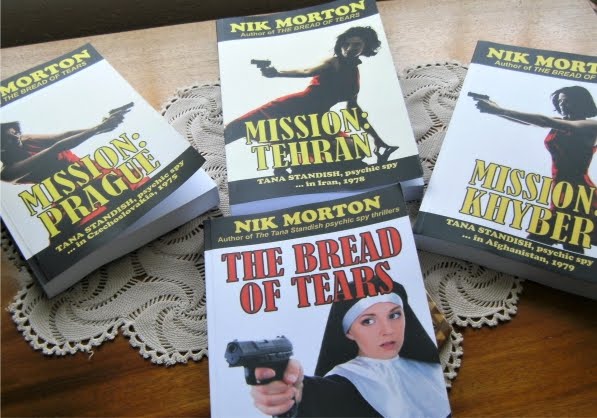As
can be guessed by the above, all the McGee titles feature a colour – pink,
purple, orange, brown, gold, red etc – and the colours are juxtaposed with an
unusual noun or adjective: Nightmare in
Pink (1964), A Purple Place for Dying
(1964), A Tan and Sandy Silence
(1971), The Scarlet Ruse (1973) and Darker than Amber (1966), for example.
The latter was made into a film starring Rod Taylor as McGee; The Deep Blue Goodbye is scheduled to
star Christian Bale and Rosamund Pike.
Cover photo by Tony McGee!
A
chance photograph alerts McGee to some dastardly chicanery and together with
the grieving Meyer he starts digging. It isn’t giving too much away (since the
blurb does this anyway), but it seems that Evan ‘had a lot of names in a lot of
places, a lot of financial windfalls after a lot of deaths, and a lot of dead wives…’
At
the end of their last caper (The Green
Ripper, 1981), Meyer was totally demoralised and was only gradually
recovering when this latest tragedy occurred. Slowly, Meyer began to return to
his old self, and after one brief moment of revelation, McGee says, ‘I’ve
missed your impromptu lectures.’ To which Meyer responds, ‘Be careful what you
say, I may try to make up for the lost year.’
‘I haven’t missed them that much,’ McGee ends (p152). Here and elsewhere, MacDonald injects humour, because life is like that. It isn’t all dark, or all light for that matter.
This
begins as a slow burn story, until the explosion occurs, then the suspense and
tension mount as the pair start asking questions.
Somebody
once wrote that MacDonald needn’t attempt to write the American Dream novel, as
each of his McGee books did that, an episode at a time, exposing the
socio-political scene, not only in Florida, but the US as a whole.
MacDonald
commits the cardinal sin of having his characters speak for very long
paragraphs, which is unrealistic, but we forgive him because his characters
always have something interesting to say, whether you agree with the viewpoint
or not. And sometimes there are special insights. Here’s a snippet from p63: ‘The
future managers have run on past us into the thickets of M-Basic, Fortran,
Z-80, Apples and Worms. Soon the bosses of the microcomputer revolution will
sell us pre-programmed units for each household which will provide
entertainment, print out news, purvey mail-order goods, pay bills, balance
accounts… But by then the future managers will be over on the far side of the
thickets, dealing with bubble memories, machines that design machines, projects
so esoteric our pedestrian minds cannot comprehend them. It will be the biggest
revolution of all, bigger than the wheel, bigger than Franklin’s kit, bigger
than paper towels.’ That’s quite a jump to now from 1982. And he couldn’t resist
the humour of ‘paper towels’, either.
McGee is a moral man but on occasion he has to be dishonest when obtaining information. He doesn’t like it, but it’s necessary: ‘No matter how many times you do it, how many times you pretend to be someone you aren’t, and you get the good-hearted cooperation of some trusting person, you feel a little bit soiled. There is no smart-ass pleasure to be gained from misleading the innocent.’
Though not religious, McGee believes in evil. ‘I start with the assumption that there is such a thing as evil which can exist without causation. The black heart which takes joy in being black… the rogue.’ (pp132/133).
MacDonald died in 1986, aged 70.


























No comments:
Post a Comment